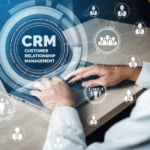Introduction
Customer Relationship Management (CRM) systems are at the heart of modern business strategies. As technology evolves, so do the capabilities and applications of CRM systems. Staying updated with the latest trends in CRM is crucial for businesses looking to enhance customer relationships, drive sales, and stay competitive. In 2024, several key trends are set to revolutionize the CRM landscape.
AI and Machine Learning Integration
AI and machine learning are transforming CRM systems by providing deeper customer insights and enabling predictive analytics. These technologies help businesses anticipate customer needs, personalize interactions, and improve overall engagement. With AI, CRM systems can analyze vast amounts of data to identify patterns and trends, allowing for more accurate forecasting and decision-making.
Personalization at Scale
In 2024, personalization will go beyond just addressing customers by their names. Hyper-personalized marketing campaigns will leverage AI to deliver content, offers, and experiences tailored to individual preferences and behaviors. This level of customization will enhance customer satisfaction and loyalty, as customers receive relevant and timely information.
Omnichannel Customer Engagement
Customers interact with businesses through multiple channels, including email, social media, chat, and phone. Omnichannel CRM systems ensure a seamless integration across all these touchpoints, providing a consistent and unified customer experience. This trend highlights the importance of maintaining cohesive communication, regardless of the channel used.
Mobile CRM
The importance of mobile access to CRM systems continues to grow, especially as remote work becomes more prevalent. Mobile CRM solutions allow sales and support teams to access customer information, manage tasks, and stay productive from anywhere. Key features include real-time updates, offline access, and intuitive mobile interfaces.
Advanced Analytics and Data-Driven Decisions
Advanced analytics capabilities are empowering businesses to make data-driven decisions. CRM systems equipped with real-time analytics can provide immediate insights into customer behavior, sales performance, and marketing effectiveness. These insights enable businesses to respond quickly to trends and optimize their strategies.
CRM and Social Media Integration
Social media plays a vital role in customer engagement. CRM systems that integrate with social media platforms allow businesses to monitor social interactions, gather customer feedback, and engage with customers directly. Social listening tools help businesses stay attuned to customer sentiments and address issues proactively.
Enhanced Customer Service Automation
Automation is revolutionizing customer service by streamlining workflows and reducing manual tasks. AI-powered chatbots can handle routine inquiries, freeing up human agents for more complex issues. Automated service workflows ensure that customer requests are routed efficiently, improving response times and satisfaction levels.
Security and Privacy Enhancements
As data protection regulations become stricter, CRM systems must prioritize security and privacy. Enhancements in CRM security include encryption, multi-factor authentication, and compliance with regulations like GDPR and CCPA. Ensuring data security builds customer trust and protects sensitive information.
User-Friendly Interfaces
User-friendly interfaces are essential for maximizing CRM adoption and effectiveness. Simplified CRM dashboards and customizable user experiences make it easier for employees to navigate the system and access the information they need. Intuitive design reduces training time and enhances productivity.
Integration with IoT Devices
The Internet of Things (IoT) is creating new opportunities for CRM integration. IoT devices can collect valuable customer data, such as usage patterns and maintenance needs. Integrating CRM with IoT allows businesses to provide proactive support, anticipate customer needs, and improve product offerings.
Customer Journey Mapping
Customer journey mapping is a powerful tool for visualizing and optimizing customer interactions. By mapping out the customer journey, businesses can identify key touchpoints, pain points, and opportunities for improvement. This trend helps businesses create more effective and personalized customer experiences.
Sustainability and CRM
Sustainability is becoming a priority for many businesses. CRM systems can support eco-friendly practices by reducing paper usage, optimizing resource allocation, and promoting sustainable products and services. Using CRM to track and report on sustainability initiatives can enhance a company’s reputation and customer loyalty.
Conclusion
The CRM landscape is rapidly evolving, with new technologies and trends shaping the way businesses interact with their customers. From AI and machine learning to omnichannel engagement and mobile CRM, these trends are driving more personalized, efficient, and secure customer experiences. By staying updated with these trends and adopting the latest CRM innovations, businesses can gain a competitive edge and foster stronger customer relationships.
FAQs
- What is the role of AI in CRM?
AI in CRM provides deeper customer insights, predictive analytics, and automation. It helps businesses anticipate customer needs, personalize interactions, and make data-driven decisions. - How does omnichannel engagement improve customer experience?
Omnichannel engagement ensures a seamless and consistent customer experience across all communication channels. It allows businesses to maintain cohesive communication and better understand customer preferences. - Why is mobile CRM important?
Mobile CRM is important because it enables remote access to customer information, task management, and real-time updates. It enhances productivity and responsiveness for sales and support teams working from various locations. - What are the benefits of CRM and IoT integration?
CRM and IoT integration provides valuable customer data from IoT devices, allowing businesses to offer proactive support, anticipate needs, and improve product offerings. It enhances customer satisfaction and operational efficiency. - How can businesses ensure CRM data security?
Businesses can ensure CRM data security by implementing encryption, multi-factor authentication, and compliance with data protection regulations. Regular security audits and employee training are also essential for maintaining data security.










